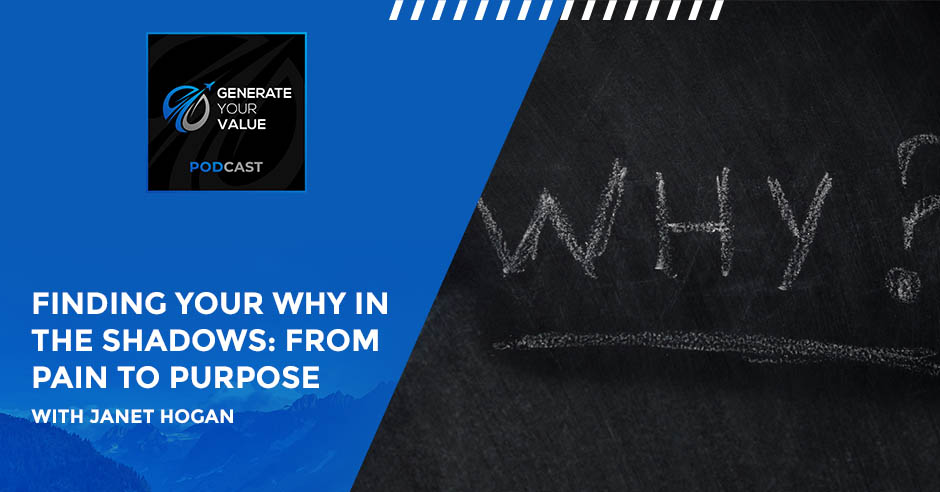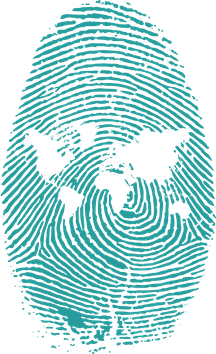Entrepreneurship can often feel like navigating through shadows, causing us to lose sight of our goals and become stuck on our journey. However, Janet Hogan, the co-founder of Oddfellows Ad Agency and the mastermind behind The Process, offers a guiding light to help you uncover your ‘WHY’ within these shadows. In this episode, she shares a transformative process that turns challenges into a purposeful mission, particularly as she identifies and addresses Andy McDowell’s pain points, leading him to discover his ‘WHY’ and guiding him toward the illumination of success. As Janet leads individuals through this transformative process, her guidance becomes the beacon that illuminates the path to success, offering a renewed sense of purpose and direction to those navigating the intricate world of entrepreneurship.
—
Listen to the podcast here
Finding Your Why In The Shadows: From Pain To Purpose With Janet Hogan
Our focus on this episode is a very small word. It’s only three letters and that word is why. I think the word why gets a little misused and a little abused when it comes to the personal development industry so I’m going to bring in an expert now to help us get the weed out of the chaff as you might say in terms of the word why and it’s impact on people’s lives. My guest is Miss Janet Hogan. She’s all the way over on the other side of the world in Bali, Indonesia. She’s a kindred spirit because she helps executives and senior leaders like I do push through their blockages and figure out why it is that their leadership is not being as effective as it could be.
She’s a kindred spirit from that perspective. To get us started, let me read her bio and then we’ll bring in Janet and have a wonderful conversation. Janet is a six-time entrepreneur. She has ground-up experience establishing a wide range of businesses from award-winning restaurants and wedding venues to multi-million-dollar real estate developments. Her biggest effort as an entrepreneur was in partnership with her partner, Ralph, in developing from scratch in an ad agency where they spent many years developing that business.
At the age of 45, she had everything in her life but felt totally empty. How many times have you heard me talk about this on the show about being and doing? Janet did a lot of doing. Six-time entrepreneur is a lot of doing but she felt totally empty out of it. Two events in her life pushed her to start focusing on her being. That was the 2008 financial crisis and a near-death experience. It gave her that nudge to start looking at her life from a being perspective instead of doing.
In this episode, we’re going to talk to her about groundbreaking work and personal development where her greatest passion lies in helping business leaders break through their barriers to realize their vision, create a positive change, and generate their value in the world. Janet, welcome to the show. I can’t thank you enough for taking your time to come spend it with this particularly since our time zones are 12 or 13 time zones away. It’s my morning. It’s your evening. It’s the end of your work day.
I’m delighted to be here, Andy. Thank you.
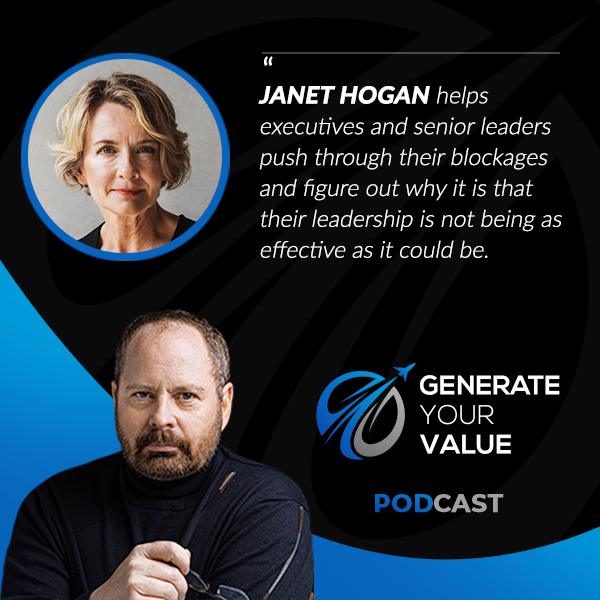
I’m going to let you fill in the gaps. In the aviation language, that’s the 100,000-foot level about your life story, but maybe you could talk a little bit about your entrepreneurial journey. What was driving you to look at six different businesses? What that evolution was like? What it felt like for you to get to the end and as you stated in your own words feel an emptiness inside?
It looked like so many of us or maybe all of us, the big carrot was money, and it was carrots on steroids in the ‘80s because that was the greatest good era. It was almost seen as a noble pursuit to follow the money carrot which we did very successfully but the weird thing is as our businesses were starting to do well, we jumped from that business to another business almost in a schizophrenic way. I then realized, in hindsight, that part of that was I was in business with my husband, and a lot of people say, “How on earth did you get married during all that time?”

We’re probably complementary opposites, but I realized that all the time, we can bring our own resolved issues into our work. There was abandonment trauma there on my husband’s side. We had an abandonment pattern where just as the business was starting to look promising, we would drop it in favor of something else. It’s the equivalent of bright shiny objects syndrome. However, despite ourselves, we were successful and we turned over lots and lots of money. I did get to that point where I had everything I thought I wanted.
This was a real confrontation for me because I still remember the day I was sitting in this kayak with my daughter Clover. She was eight. I was surveying everything that we created. It was literally a Richard Branson-style luxury lifestyle in the tropics with palm trees, framing the house, a private beach next door, and lapping it out in our footsteps. Looking at all of these, I’m going, “This is the moment.” This is the moment where you go, “We made it.”
This was a very moment where I experienced a depressive void that so many people talk about and it was almost like a paradox. What do you do with that feeling? Also, how do you talk to anyone about it because I would sound like a total wanker to start complaining about my luxury lifestyle? There was guilt about not being more grateful. I did nothing with it and I remember it was a Sunday so I was like, “I’ll do what I always do. I’ll set up my desk and do some work,” like you do on a Sunday when you’re a workaholic.
It’s because I didn’t do anything, I feel there was a divine intervention in the next year, which was 2008. Basically, everything that we’ve spent in the last many years working so hard for was ripped out from under us. Also, because my identity was tied up so much in the number of zeros in our bank account, it was like I became a big zero as we lost everything to the point where I wanted to check out because I didn’t know who I was and I didn’t have any sense of identity. I felt like a hollow person.
I remember wheeling around the garden at 2:00 in the morning. Everything was monotone. All the color drained out of everything. It was a full moon. I then went up to my husband and I shook him by the shoulders. I said, “I can’t do this anymore.” Fortunately, he said, “We’re going to get through this together,” which we did but that didn’t answer any questions for me.
At that point, I had to throw everything that I believed away and start afresh. That’s a scary place to be when you’re terrified that if you take any look within, you’re going to find nothing there. I’ve been such a good model of running away from myself for most of my life that it became almost unthinkable to stop, pause, and look within. It was the horror of horrors. It’s like, “What if I don’t like myself, or what if there’s nothing there?”
Throw away everything that you believe and start fresh. Share on XWhat it did lead to was lots of seminars and workshops that promised a lot but didn’t seem to deliver anything. My advertising self said this is BS. All these programs promise transformational change yet so few seem to deliver. Also, there doesn’t seem to be any accountability. The business person me said, “You have to be accountable if you’re going to charge people money for something you have to deliver an outcome.”
There was that kind of slight dismay and then growing skepticism about the whole industry until I went to a Face Your Fears boot camp where I did get a life-changing moment. That was where we were asked to submit ourselves to a person who would walk up to us and squeeze our carotid arteries until we passed out. This guy came up. He looked like someone out of the Hell’s Angels. He squeezed my neck. Since it was such a controlled environment, I wasn’t so concerned. I wasn’t scared but I was I was curious. I thought, “I’ve heard so much about people seeing the light at the end of the tunnel that I thought maybe that would happen to me.”
Instead, what I felt as I was passing out was that it was like a tsunami of disappointment. It was like a tidal wave took over. In that moment, it must have been just a split-second realization. It was, “This is what I would have fell had it been my actual death. This is the judgment day summation of my life. Janet, you’ve let everyone down.”
When I came to, it was with a huge tidal wave of disappointment. I was sobbing. The next point after that was self-righteous anger. It’s like, “How dare that be the summation of my entire life, me who sacrificed everything, the noblewoman, a mother, a tireless worker, a self-sacrificial wife, etc.?” There was an a-ha moment of, “Of course, I’ve let everyone down and no one more so than myself.” I say this about myself, but I feel it applies to all of us.
In denying the world my gift, I had no idea what that was, but there was a sense that I kept something buried. I wanted something that I’d been given. This act of selflessness that was my life was the supreme act of selfishness. That led me to, “We’ve got to find out what this thing called purpose is because there’s something there. I don’t get it money was not my calling so what the heck is?”
You felt like your skills and talents were in money making in business unto itself with no introspection to say or discover what other skills or talents you might have.
Yeah, and would it be possible to have a business that you didn’t want to keep running away from? That was the other thing. What is that thread in some businesses and in some endeavors? Some people call it vocation that keeps us there hanging in throughout all the ups and downs. Why is it that some people persevere and then there are other people like us up to that point who gave in as soon as it got a little bit hard and did something else just because we could? That became a question.
I think with the abandonment, you were abandoning the business before the business had the opportunity to abandon you from a straight business perspective and then something came along that was bigger than your business that forced the issue.
Yeah, exactly. Also, the business becomes irrelevant. It might be a vehicle for getting this thing out there or it might be something else.
Let’s talk about purpose and why. In your own words, what do you feel like purpose/why means in somebody’s life?
The word purpose used to annoy the hell out of me. I went to a religious school and I thought it was a religious moment. It was like a bolt from the blue where some people were struck by this thunderbolt of meaning and the rest of us were left to wallow in nihilism. I then realized that it wasn’t that and in fact, there’s no elitist aspect of purpose at all. We all have potentially a purpose and it’s not necessarily about saving thousands of lives or being Mother Teresa at all. It’s a far more personal journey.
You and I were talking about this. It’s not only following your joy because that would be too easy. It’s not going to the place that we expect which is the positive place. What purpose speaks to is starting to understand what it is that terrifies us about ourselves that very few of us confront and going there to find the answers to the place that you least expect. From that place that we don’t want to visit because it requires courage, it is like a quest. It has the feeling of a quest like a hero’s journey.

If we can come out the other side, we bring with us that elixir which is the healed self. When we put that out into the world, it’s only normal that when we feel whole and healed, we’re going to want the same for others somehow. That’s the natural pathway. My husband hates this term but that’s what I would call being in service to others.
What it means is that it’s no longer about you. We’re not self-obsessed. However we’re doing something that is supremely or nobly selfish, it lights us up. It must. Otherwise, we wouldn’t persevere. It’s about going within and finding that part of us that we don’t want to own which I call the shadow self, but I think the shadow is probably not very well understood.
A great analogy for this is you have somebody who lives in a particular area. Let’s call it a wooded area. It’s doing its own hero journey in getting to know the lay of the land. It’s exploring around. It has good days and bad days relative to exploring but has this experience in the area. In an effort to serve others, they’re going to use the experience that they have from exploring this area. I know this is a simplified analogy, but they can now act as a guide for others who are going to experience that same hero’s journey or that journey through the shadow side, the traumas, or whatever it is that they’re looking for total healing as well as finding the authentic self.
It’s a continuation of what we’ve experienced and what others are experiencing. Let’s say it’s pain, suffering, and identifying that in others. Our self, if you like, is helping others heal. All of this might sound very metaphysical but it can show up in all sorts of different ways. I think the way to make sense of it is to understand what drives it in the first place.
Let’s say that we all have our own brand of pain. We have a particular pain point and normally, we can find that from our childhood and it’s usually also played out. It’s rippled out in most of our adult life for most of us. If we can understand what that type of pain is and put a name to it, that gives us a clue. For example, I spend my time as a human doing on steroids running six businesses, thinking that money was the god, and in the process losing my identity.
I remember one of these workshops that I attended and the fellow facilitating said, “Your job is to tell the audience the last thing you want to share with them or the last thing you want them to know about you.” It was very spontaneous. I said to the audience, “I’ve spent the last many years of myself buried alive,” and then I melted on the spot. The reality of that hit me. It’s because I hadn’t even thought about that before. It just came up.
If I wanted to say, “What type of pain do I call that?” I would call that the pain of self-betrayal. That is the dagger in the heart for me and I think we all have our own brand of dagger in the heart. If we want to find our purpose, then the first place to look is at that pain point. It usually shows up in the heart. If we go into our body, we feel it around there or the stomach and start to do an inward journey into the self from there to see what that reveal.

You and I both have had similar journeys from the perspective that we discovered our why out of that pain. Your pain was in all the doing and being buried alive as you say for me. It’s been in self-esteem and self-worth. It came out of the pain of the divorce that started that journey of healing for me. It’s realizing what it is that I brought into the marriage from that perspective and finally, looking deep inside saying, “You got to own it. If you want a better life for yourself, you need to own it and go heal.” It’s not to say that many years later, I’m 100% healed but I’m a long way down the path from that perspective because it is a journey through the rest of your life.
Let’s say, Andy, that the divorce was a symptom of something deeper. The divorce was like the canary in the coal mine going, “We have a problem,” and now the pain points got to a level where it’s no longer tolerable. That’s where the change happens. A lot of people say, “Do I have to have this dark knight of the soul?” Maybe you don’t have to have it but if you do have it, it’s almost impossible not to come through that.
You have a choice. If you are in that bleak place or that ground zero point, either you do check out physically or something changes metaphysically like a belief or a pattern of behavior that’s seen you through life after this point, but it’s not serving you anymore. There’s a metaphysical death where you go, “I’ve got to start afresh and a clean slate. Where do I go now? Who am I?” That’s where I think we need a little bit of education to stop us running away from ourselves and to stop us going to the first numbing device, whether it’s porn, alcohol, gambling, or whatever it is.
We need education to stop us from running away from ourselves and going to the first numbing device. Share on XWe’ve got to start turning around and confronting that. If I can share a story, Andy, that came from my childhood. Quite often, when we’re talking about purpose, we get clues from our childhood. In fact, as Steve Jobs would say, “You start joining the dots retrospectively. It’s easy in hindsight.” I think that’s true. There was a long-running show on TV back in the ‘60s called Lost in Space. Maybe some of the people reading will remember that. Every episode featured a particular monster.
That was what made it so compelling for us kids watching it and the delight of being scared to death. Apparently, officially, the scariest monster of all and definitely the one that gave me nightmares for a long time after watching that episode was the mummy. I think the terrifying thing about it was talking about loss of identity. It was this creature that had no face so you couldn’t see into its eyes. I would have this recurring nightmare of this mummy figure that used to hang outside the spaceship of Family Robinson.
It was always there like a shadow. It was always lurking and never coming inside the spaceship, but is always there. I had this nightmare of this slow monster making horrible groaning sounds scraping up our suburban driveway in a house in Sydney and me waking up in my bed waiting for it to come and get me. I would get out of my bed, walk out into the backyard, and motion to the monster to come and sit down on our concrete steps outside the kitchen.
You know how dreams can sometimes be a little bit lucid. You’re there as a witness and also there is a participant in the dream. I remember thinking to myself, “You should just kill this monster. Otherwise, it’s going to kill you and your entire family.” Instead, I just sat down with it. I started talking to it and saying, “Wouldn’t be better if you didn’t kill us? What’s the point really? What are you going to get out of it? Suddenly, we’ll be dead and there’ll be no one else left to kill.”
I was thinking about this and I thought this is very similar to shadow work. When confronted by the monster, we could just get up and run or we could grab a knife and try and kill it. Stab the mummy or we could do what I did in my sequel to this dream, which was sit with it and realize that it’s not going to hurt me. It’s reaching out, putting my hand on its face, and feeling the texture of that cloth beneath my fingers.
Realizing as I did that some of those tightly wound bandages were starting to fall away, started to peel them, unpeel this monster, and unwind the cloth. As I did that, I realized there was no horrendous maggoty body inside. It was shafts of light. The more I peeled the cloth, it sat there in a pile of rags. This light is coming through and the light ultimately, when we can confront our darkness like that, we realize it’s part of us.
The light enters us. It is us. This metaphorical monster that we’ve been spending our whole lifetime running away from was a part of us that we’d never fully owned. That’s the best way I can describe the shadow self. It’s there to protect us but we don’t understand it. It’s only when we start to explore that shadow. I realize it’s an ally. It’s not an enemy and it’s a part of us. Once we can find out what’s behind it, we can start to feel this sense of wholeness.
When we can confront our darkness, the light enters us. Share on XDo you think the shadow side is that inability to see ourselves as being 100% perfect? We understand we’re not perfect human beings but we want to be. All of a sudden, we start having shame and judgment. Perfectionism comes into play. If that stops us from A) Being introspective to look honestly at ourselves and B) To realize that we have the light and the shadow within ourselves. It’s like Yin and Yang or masculine and feminine energies and so forth. We have light and shadow that’s inside of this. It’s a natural part of this and it’s not something to be afraid of. It’s something to understand about ourselves.
How does this work? Think of the shadow as an overactive part of us that is designed to keep us safe. For some reason, in humans only, we seem to be the only species wired this way. We have such an overactive shadow. Think of how fear-based we are. Seventy percent of our thoughts are fearful negative thoughts. That’s insane, particularly if you think how many tens of thousands of thoughts we have a day according to Dr. Joe Dispenza.
If that’s true, it means that we are almost doomed to live in a fearful state. The fear builds on itself and compounds. We become more and more scared, anxious, and depressed, or however that shows up. If we start to think of the shadow as an overprotective device, it’s supposed to be a seatbelt, but it’s more like a straitjacket. It is designed to keep us small because the theory is if we start to become big, seen, and a person of influence, it equates to danger. We might fall into harm’s way.
It’s far better that we stay small and live a mediocre life. That way, we’ll be safe and we’ll probably only realize what a disaster that is when we draw that final breath like I did. It’s like, “Janet, you’ve let everyone down.” What if that’s not true? What if we’re not supposed to live that small life of quiet despair? What if, in fact, we are supposed to be fun, joyful, and silly people? We’re here to have fun. What if that was our ultimate purpose to be able to live without fear? How cool would that be?
That’s where we start coming to our why. The business word for why would be vision. It’s having a vision. What’s our vision? The vision that’s bigger than ourselves. If I reference my own life, I would say, “My vision was formed by a life of self-sacrifice like so many of us. It’s not only a woman’s domain. It’s men particularly. Men are so self-sacrificial as the breadwinner. Also, in the theater of war, men will throw themselves at bullets and become cannon fodder.
Men know all about self-sacrifice. What if it wasn’t supposed to be sacrificial? What if we’re supposed to have fun? What if it wasn’t supposed to be work and no play? What if we had a job that we enjoyed and what if that occupation became a preoccupation? It’s the thing that pulls us out of bed in the morning. Why could that not be a possible scenario and how cool would that be?
As we have it now, they estimate about 80% of the workforce actively hates what they’re doing. We spend most of our waking hours at work so that strikes me as insane. A minority of 20% of people profess to enjoy what they do. What if we could flip those numbers around? I feel that the secret to that is confronting ourselves, confronting that shadow self, and finding out what is it that’s holding joy away from us. What is it that is saying we must sacrifice ourselves? It’s not out there. It’s in here. How do we unlock that?
This episode is about that simple word called why but there are two other simple words, and and or. We like to live by the or. It’s either me or you. I’m going to be self-sacrificing myself and my joy in order to be the leader I think I’m supposed to be or some requirement or perception of what life should be through what we’re taught in our upbringing.
Also, through religion or some other things we don’t take a step back and go, “Why can’t it be the end? Why can’t I be my authentic self and live a life that’s fun and joy, and be a tremendous leader?” I don’t have to be self-sacrificing in order to have an impact and influence. Also, be a very effective leader in whatever it is that I’m leading whether it’s a community, a business, a team within a business, a company, or whatever it might be. I think that’s where people get stuck. They get stuck on the or instead of seeing the and.
I’d love to talk about the process that you and I went through as a way of showing whoever is reading how structured it is because it’s the thing that always perplexes me. I know Simon Sinek seemed to be the person who kick-started this conversation when he had that seminal TED Talk Start With Why. What perplexed me after that was, “How? Where do we go from that? What does that mean?” I know Simon’s advice was to talk to a friend who knows you really well, but we’re still externalizing if we do that and how reliable is that?
What are the chances that they’re going to pinpoint that thing that hasn’t been expressed within you? One of the things that I’ve noticed, and I include myself here, I remember having a business coach when we had a wedding business, which was one of the crazy businesses that we ran just because we could. We thought we’d get all professional about it and we’d hire a coach. I remember the first question that he asked me. He said, “Janet, what do you want?”
This was when I had everything. I remember looking at the blank sheet of paper and getting emotional which was not like me. I was like a cold fish. I was like, “What’s going on?” I’m feeling this emotion and also, I don’t have a clue. I don’t know what I want. That was the first inkling that there was something weird going on within me that needed to be unlocked. I realized that people find it hard to nominate what they want and they might go for the wrong thing. They might get into their head not the feeling itself. They’ll get into thinking self.
I thought most people however know what they don’t want. What if we could compile a list of the things that we don’t want and it’s not a list of obvious things like living in poverty or starving? They’re the kind of top-level problems that confront us all the time, but they manifest as emotional symptoms like what I would call pain points.
I put together a list of what I felt were about 150 of the most common ones and what if we could individually look at what are my three top pain points? Is it isolation? Is it loneliness? Is it self-sabotage? Is it depression? There are so many flavors to this and everyone I’ve noticed has their own combination that’s unique. What if we could name the pain and from that, do the deep dive into the feeling self and find out what’s behind that pain because maybe that’s the light that’s waiting to be revealed?
Deep dive into the self and find out what's behind that pain because maybe that's the light that's waiting to be revealed. Share on XFor the audience, Janet, over a few years of doing this current business of coaching with the executives and leaders, has developed her own process that goes through the pain points. She was nice enough to offer me to sit down for a schedule of an hour, but it ended up going for an hour and a half of having me and myself go through the process to see what kind of outcomes we got. I thought it would be a great way to illustrate to have me be the guinea pig here on the episode to talk about the process, what my outcomes were, and lift the lid on it a little bit so people can understand the impact this process can have on you.
I work with triangles mostly because I love them. You can’t bend a triangle out of shape. It’s a solid object and also, it’s pretty easy to remember three things. I can remember three things. We bring it down to three and I recall when we funneled your three core pain points down to your top three. If you imagine an upward-facing triangle, on the bottom left is the third core pain point. You’re one was worry on the bottom left and then we had stress on the bottom right.
At the top, we had inability to receive. Here’s what I’ve noticed about working with triangles. It’s interesting. The thing that is the biggest issue for us tends to float to the top intuitively. We know what that is. It’s just a word and words are not perfect, but they open up and they’re like a key to a special portal. There’s that expression in the beginning with the word. Words can be powerful. Let’s say that these words are a key.
How this tends to work is that whatever is at the top of the triangle tends to be brought about by the two aspects at the bottom. In other words, we have what I call the shadow mission for you, Andy. Every one of our shadows has its own mission. It’s how it keeps us small and stuck. It sounds something like this. It was stress that caused the worry. Through stress and worry, I create an inability to receive or I am unable to receive. It keeps us in a state where we’re not open to receiving. That makes sense.
It then goes a step further. Through stress and worry, I’m unable to receive and therefore, I must do everything on my own.
Yes, that’s right. When we have an active childhood wound within us which is almost like everyone does. Let’s say that this is the human condition and it evokes a sense of shame. There’s usually shame attached to it. Imagine then that there was something that happened in your childhood, Andy, that caused you to experience shame maybe for the first time or the first time at least that you remember where it made an impact. Do you recall that time when you were conscious of feeling shame?
I’m going to share a story I didn’t share with you. I had a multitude of experiences in my relationship with my dad where I had some kind of project to complete, usually with school. What I’m going to share now is one that wasn’t in school. A lot of it comes down to my dad projecting on me his own lack of confidence in himself to do technical things.
I had an instance where I was in Cub Scouts. I’m not sure if you have Cub Scouts in Australia or not, but it’s a group in the United States. It’s the Girl Scouts and Boy Scouts. You earn badges doing certain activities in an effort for you to learn and grow through experience. One of the events Cub Scouts are known for is the Pinewood Derby. What the pinewood derby is every Cub Scout gets a kit. It’s a block of wood, some wheels, some nails, and some axles made out of wood. You have to craft a little car out of these materials.
You’re going to race against other cars that the other Cub Scouts built. You have this track that’s high at the top and it goes racing down the hill. Whoever gets their first wins, you can go to race after race after race until you get a winner. I was probably about 8 or 9 years old at that time. I was fully expecting to work on it with my dad because it’s going to involve hammers, saws, and other things that you’re told as a kid to not touch unless your dad is around.
My dad didn’t have a lot of confidence in his ability to work with tools so he took it to work where people had those kinds of skills. Now they put the car together and you had a weight limit on the car. They put the car on a scale. They screwed screws in the bottom of it to try and get it as heavy as possible right up on the line with a thought that the more mass that you have, the faster it’s going to go down the track. All I had to do was paint the thing.
Like some other events you and I talked about, I came in second place but I didn’t feel like I put any work into it. It wasn’t my work because 80% to 90% of it was done by somebody else. It wasn’t me. It wasn’t my dad from that perspective. I lived with that shame and a judgment or that secret if you will that I hadn’t done the work, yet I’m walking around with a little plastic trophy saying it came in second place.
This leads us to the thought that underpins all of this. In the same way that we have a core pain point that we can express as a word, we have what I call a core destructive belief. I don’t know what yours is but it could be in that realm of, “I can’t do it on my own.” It’s usually an “I am” statement, but it could be in that area. Anything that feels like it’s a ball or M&M’s lolly. There’s the dark chocolate shame inside and it comes in this waterproof wrapping of a thought that makes sense of the shame.
“I feel terrible because I can’t do anything on my own,” and then that sets off the overcompensating self which might be something like, “I must do everything on my own. I must live my life.” That’s how we get into this terrible territory of two full selves. The one that’s attached to shame and almost inferiority. The one that’s attached to superiority and they do an endless battle with each other. I call it the pain pendulum. We swing between the two. In that process, we totally bypass our core truth, which only has to hang there.
To be our true self requires no effort. It’s hard work keeping shame alive, and it’s hard work saying to yourself, “I must do everything on my own.” Think about how that’s played out and how that speaks to inability to receive. Am I able to receive help from others? No, because I have to do it on my own. That’s not a conscious thought. This is below the surface. We don’t even know that it’s going on. It’s only when we start going here that we can bring all this stuff up. While it’s operating beneath the surface, it feels like, “Why am I struggling? Why is life so hard? What happened to my marriage,” and other aspects that we might have let go of that we are so attached in some way.

To continue on my process, we’ve identified the top three pain points which then leads to what in your process?
We will take the first one, which is stress. What would you say Andy creates stress in your life? What would be a typical stressful situation for you?
Being a Virgo, it’s perfectionism. If I feel like I’m not doing it perfectly in some way, it starts creating stress.
There’s a process that we go here where we do a deep dive into what that feels like in your body. Can you identify that as a pattern? Do you recognize this from another time in your life going right back to that childhood? Let’s say it took us to that childhood moment that you shared where this core distracts people’s belief is created. What happens is it’s a bit like that story of me sitting next to the mummy and talking to the shadow, the thing that terrified me, and realizing there was nothing to be scared of.
We have to have a coming back to the self. The little Andy who is feeling so ashamed is where the shadow starts to kick in and want to protect little Andy and the adult self. Bringing the two together so that there’s like a reconciliation within. That’s how we start to heal that childhood wound. When we get a sense of what it feels like for that child who is still suffering within us, that’s why they say sometimes we can be a grown-up person but our behavior might reflect a five-year-old when we get stressed.
If we can start to reconcile and heal that wound or that feeling that speaks to low self-worth, “If I can’t do it on my own, how worthy am I?” If we can start to heal that and realize that all that was is a response to something that happened to you. It had no reflection on your true value. It’s interesting now that you talk about value because it’s coming from it. It’s a good example of how purpose plays out. When you know the pain of lack of self-worth, you want to explore your value and how you can bring value out in others.
When we start to heal that childhood wound, that’s when we can start to see, “What’s behind stress? What’s on the other side of stress that doesn’t feel so heavy where I don’t have to be perfect and things are okay just as they are flaws and all? What feeling does that evoke in me?” I remember when we worked through this process, which I’m now describing so we’re not doing it. What was at the back of that as it turned out was love. The energy of love was behind stress, which I can understand too because stress is when we stray away from our true self. If that’s the essence of who we are, it would make sense of coming back to yourself evokes of feeling of love.

We then take that feeling of love and we apply it to the next thing on that triangle which is worry. When you’re stressed, Andy, what happens at that point? If you feel stressed, something is not turning out the way you thought it would or you’ve got so many things on your to-do list that you don’t know how to do them all. What happens after that? What comes off that stress?
It’s a worry that I’m not going to be able to find a solution or have a good outcome.
At that point, we go through the same process. We go, “We realize that stress is a symptom. It’s not who you are. The part that it’s suppressing is love.” What happens when we take love and apply that to worry? What does that open up? What does that make possible within you? It’s because worry is blocking something that’s within you. It’s a barrier. When we apply love to worry, what opens up at that point? What does that allow?
It allows love to feel creativity. There’s no worry and it’s freedom. It’s a blank canvas that allows you to be as creative as you were born to be.
Now we’re starting to change this triangle of darkness into the triangle of light. At the base, we have, “Through love and creativity, I create a world of.” Once you are opened up to what you love to do and then you go, “How can I use this creatively? What can I create now in this space?” What happens to that inability to receive? It’s where everything has to be done on your own, what happens to that once you’re starting to bring love and creativity into this space?
Change the Triangle of Darkness into the Triangle of Light. Share on XAs we talked about it, we have faith in others. Faith in the fact that if I’m creative and I’m creating something of value or I feel like it’s going to be a value in the world, then that’s going to be received well by others and some type of exchange is going to happen. If I don’t have faith in others that they’re going to show up, recognize the value, and do an exchange, what is this all about then?
This is where we’re talking about turning work into play and bringing faithfulness and silliness into the space. The more you do what you love, the less you’re going to want to do what you don’t love. At some point, we have no choice but to start delegating. What are some things that you love doing, Andy? What lights you up?
It’s helping others to find their light. This is why I do what I do, but also, the engineer in me loves the technology things. For example, this show is going out on video now for a season that we’re doing it but that requires me to learn some new technologies to be able to do that. I spent some time learning these technologies. I was full of joy and creativity learning this stuff and building stuff irrelative to be able to deliver this show in video now, let alone audio like we have for three seasons. I was able to take a step back after the weekend going, “That was a lot of fun,” because I was being creative. I was using technology to help create something that hopefully is going to be of value to some people.
Were you feeling stressed or worried while you were doing that?
No.
At that point, we become nobly selfish and we go, “I want more of this.” To be able to have more of this, we need to draw another to do the stuff that we hate. This is where instead of the inability to receive, we are now entering the space of having faith in others. As a little side note on this which is interesting because we talked about the feminine and the masculine. I see this in a lot of men speaks to a suppressed feminine side and women can show up.
I personally have an over-inflated masculine side as well. I have a challenge receiving it also. It’s not just me. What we’re talking about, love and creativity are all the right brain stuff. That is the feminine energy. That seems to be where the world is starting to slowly shift towards, particularly in a world that’s becoming facilitated by AI which takes care of all the logical left-brain stuff more and more.
If we are going to grow in any direction, it’s probably going to be in the more intuitive areas where our creativity can flourish. As much as people are talking about what’s happening to the world. It’s going to be a s*** show while everything collapses might be true. However, I think on the other side of that because we humans are so adaptable, what’s going to emerge is a more creative space where it’s almost expected that you use your creativity, ingenuity, and imagination going forward.
It’s because the bots will have the rest of it looked after. What we’re talking about here is almost like maybe this is the next stage for humanity to start to embrace the feminine. I’m not talking about men becoming more female by the way. It’s not that. It’s the energy. This puts all of us into a space of being able to receive and ultimately collaborate. We’re starting to work with each other not against each other in competition. Now the whole flavor of society starts to shift to one that’s more fun and playful.
I wrote a LinkedIn post about more and more as we go down and AI becomes more popular. You cannot afford to not be creative in life because it’s where the opportunity is going to lie. It’s because computers can program logic. That’s what they were built for. It’s for that perspective. That leaves creativity in the more feminine energy side is going to be where the opportunity is regardless of your gender to go out and add value to the world.
This is not a gender story. It’s an energy story. It’s yin and yang. It’s so true. That’s how it’s so exciting. Despite all the fear that might be circulating at the moment as we know that there’s going to be a chaotic moment, systems break down, but maybe those systems weren’t serving us anyway. From that I think will emerge a more bold, playful, courageous, fun, and happy human. We certainly couldn’t be a lot more miserable than we are at the moment. There are a lot of mental health issues, which we’re seeking external solutions for so maybe there will be the day where we feel it’s absolutely not only normal but mandatory to do shadow work and understand that dark side of us because that’s where all the light is.
Let’s tie up this topic. We came to an answer of faith and others are at the top of my triangle. How does that relate to my why?
In a way, you’re already practicing or expressing your why through this show which is all about value. I suppose if you’re asking someone about what value means to them, it implies that you already have faith in others and that you want to see others succeed. On a personal level, what it means is more and more trusting of others to do the stuff that you don’t want to do. Also, working more with others. That’s like a flower. That opens up all sorts of possibilities in relationships, friendships, working collaborations, and joint ventures. It’s saying partnership on all sorts of levels.
That’s pretty big but I think possibly also as you are someone who through this show is bringing people together through conversation. In terms of your why, every time you bring someone, a fellow human to a place where they can appreciate their value and start to heal that lack of self-worth, you are fulfilling your purpose because you are healing at the same time. That ultimately is our why to understand what causes our suffering and to help others suffer less accordingly in the same way. As we do that, we heal ourselves. It’s like a benevolent loop.
The way I like to look at it is I have total faith in myself. I’ve been through the journey. I have faith in others that they can go through that journey themselves if they want to and I’m here as a guide and a coach to help you through that journey. My faith in others is a faith that you have in you to do this. You just have to make that choice that you want that for yourself in your life.
In your life as a coach, your success hinges on your belief in others. It does because people sense when you believe in them and when they can feel that you believe in them, then they will rise to the occasion.
It makes them feel seen which is what we all want.
Every time you do it, that little boy who didn’t get to make the go-kart and just got to paint it was addressed. He’s seen. He’s healed. He’s validated. That’s basically our purpose. It’s to feel good about ourselves, heal, and not suffer. The why is to end suffering in ourselves and possibly in others. That’s how we do it. That’s how we end the suffering ourselves by healing the pain and healing that in others. It sounds very saintly. It’s not a Mother Teresa statement. It’s almost a selfish way of living but nobly selfish. Does that make sense?
Yes. It’s the positive side of selfishness.
It has to be a little bit selfish. We know self-sacrifice doesn’t work. We all end up bitter and resentful. We don’t want to be like that. Let’s ditch that and go with noble selfishness where we are putting ourselves first and doing what we love. You do what you love, express your creativity, and see what happens. Seeing how you open up to others and others open up to you. Your whole world becomes more fun and more connected. Isn’t that what we want at the end of the day? It’s more connection by showing up as our real selves and not trying to be someone that we’re not.
Unfortunately, our time is coming to a close and we have one last question for you. The Generate Your Value Community has one last question we ask every guest. That question is, what do the words generate your value mean to you?
I didn’t think I had any value for most of my life. What I realized is that we all have a gift. While we stay overshadowed by our shadow, we will deny that we have a gift. We’ll say, “I’m nothing special.” We’ll call that modesty. We are humble but it’s not humility. Once we get to this stage of integrating our shadow, that’s where we start to see our gift. That’s what I would say is our value being propelled by that desire to help others because ultimately, we help ourselves. It’s a giving loop.
Putting our gift out into the world and then using that to make a difference and to solve a problem for others. That’s our value. It’s our inherent assets. It’s our personal inventory expressed. In that state, not only do we put it out there, but we also receive it. Expressing our value must also talk about the ability to receive because if we can’t receive in terms of fulfillment and financial reward, we’re going to run out of steam. Expressing our value is a process of giving and receiving, which is quite relevant to what we were talking about. We must be able to receive. This is a note to self by the way.
We can’t thank you enough for coming on to the show and sharing your gifts and your process with us. If somebody wanted to reach out and engage with you in some way and for any reason, what’s the best way they can reach out to you?
The best way is to go to my website JanetHogan.com. If you do that and it’s very simple, it’s like a scrolling page. You go right to the bottom and you’ll find that exercise that you and I just went through. It’s called the Inner Compass and it will take you to that first step the triangle of darkness. You can try it out for yourself and see what comes up. What are your core pain points and that’s the first step to starting to work out your why.
As somebody who went through it, you get presented with a whole bunch of different words describing emotions and so forth. I can’t remember if it’s 12 or 15 that you start with and you keep wheeling it down until you get to your main three then you have to sequence the order from what you feel is strongest to weakest out of the three. That’s what forms your triangle.
When you get to the flip side of that, it’s where you get your personal mission statement. Andy, for you, that’s through love and creativity. I create a world of receiving because you are creating a world of receiving for yourself and others. That’s your mission statement. Your purpose is to have faith in others. That’s why we’re talking now. That’s the connection between the spiritual and the self. That’s the glue in between.

It was my big a-ha moment out of our conversation. It was that glue and how it all fits in for me in my life and my life journey. For the audience, as you’ve heard Zach and I say before, I hope you found some golden nuggets in our conversation that you can integrate into your own life, whether it’s your personal life or your business life that’s going to help you grow, your life journey and your hero’s journey. If you haven’t already discovered your mission, vision, purpose, and why, it is your oak tree that you’re going to hang on to in the good times in the bad times to understand, “This is why I’m here.”
For me, it was a big monkey off my back to understand it about myself and where I was going in starting my journey to find joy and happiness in my life. We can’t thank you enough for taking that valuable resource in your life called time. It’s finite. We know you had a choice and we’re glad you made the choice to come tune into this episode. We hope that you’ll have a great day and week. We’ll see you next time right here on the show. Take care.
Important Links
About Janet Hogan
 A 6 x entrepreneur, Janet has ground up experience in establishing a wide range of businesses, from award-winning restaurants and wedding venues to multi million dollar real estate developments. However her most formative years were the 20 she spent in advertising, establishing her own ad agency, Oddfellows, with partner Ralph, in Sydney, Australia. Advertising spoke to her fascination with human behavior and problem solving, combining both to create some of the country’s most high profile and successful consumer brand campaigns. It’s the same skill set she applies today to her groundbreaking work in personal development where her greatest passion lies in helping business leaders break through their barriers to realize their vision and create positive change in the world.
A 6 x entrepreneur, Janet has ground up experience in establishing a wide range of businesses, from award-winning restaurants and wedding venues to multi million dollar real estate developments. However her most formative years were the 20 she spent in advertising, establishing her own ad agency, Oddfellows, with partner Ralph, in Sydney, Australia. Advertising spoke to her fascination with human behavior and problem solving, combining both to create some of the country’s most high profile and successful consumer brand campaigns. It’s the same skill set she applies today to her groundbreaking work in personal development where her greatest passion lies in helping business leaders break through their barriers to realize their vision and create positive change in the world.
